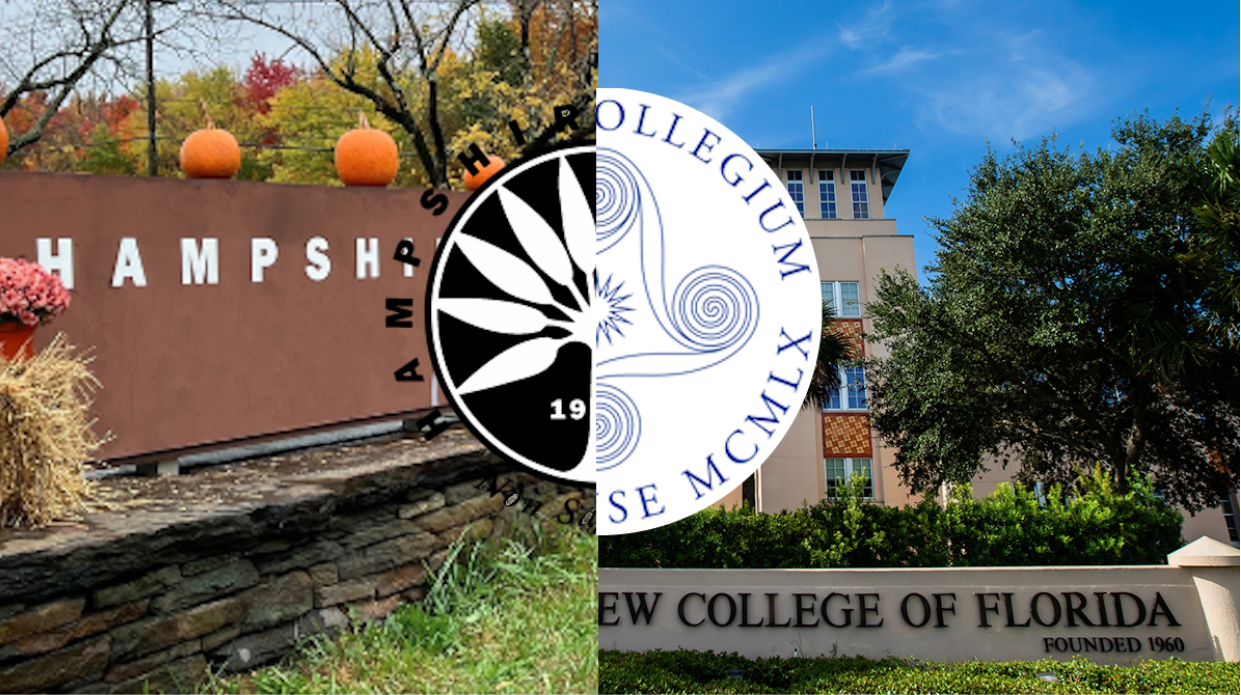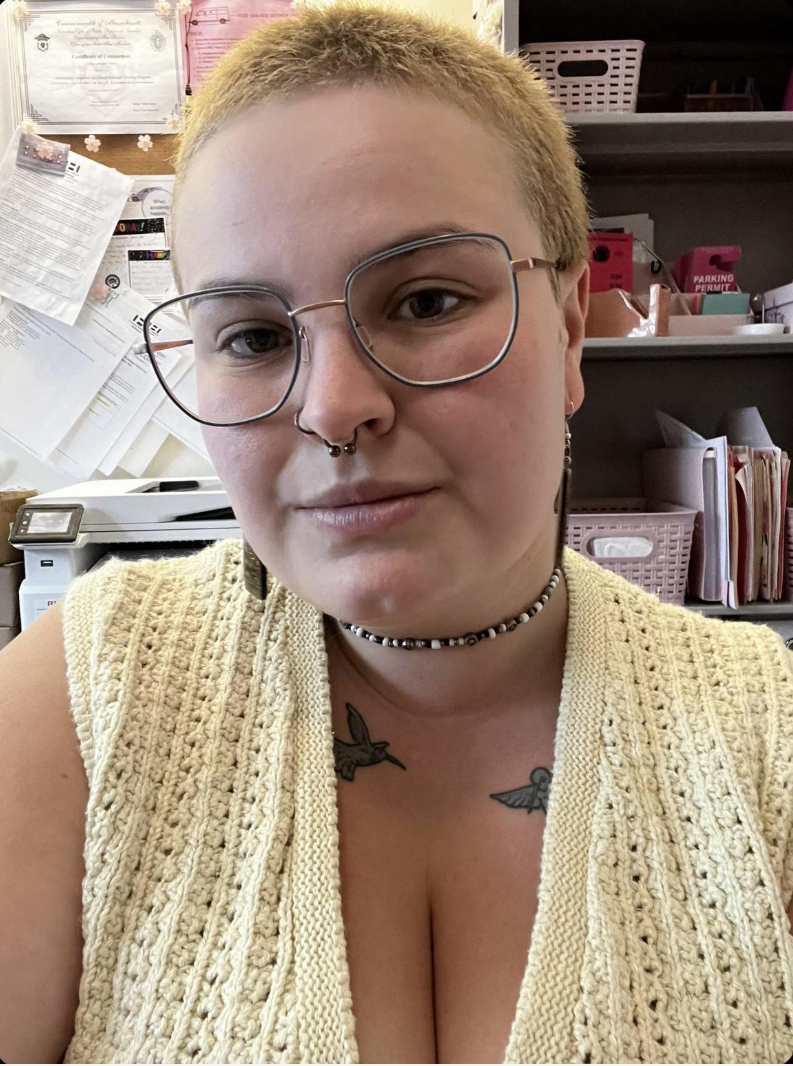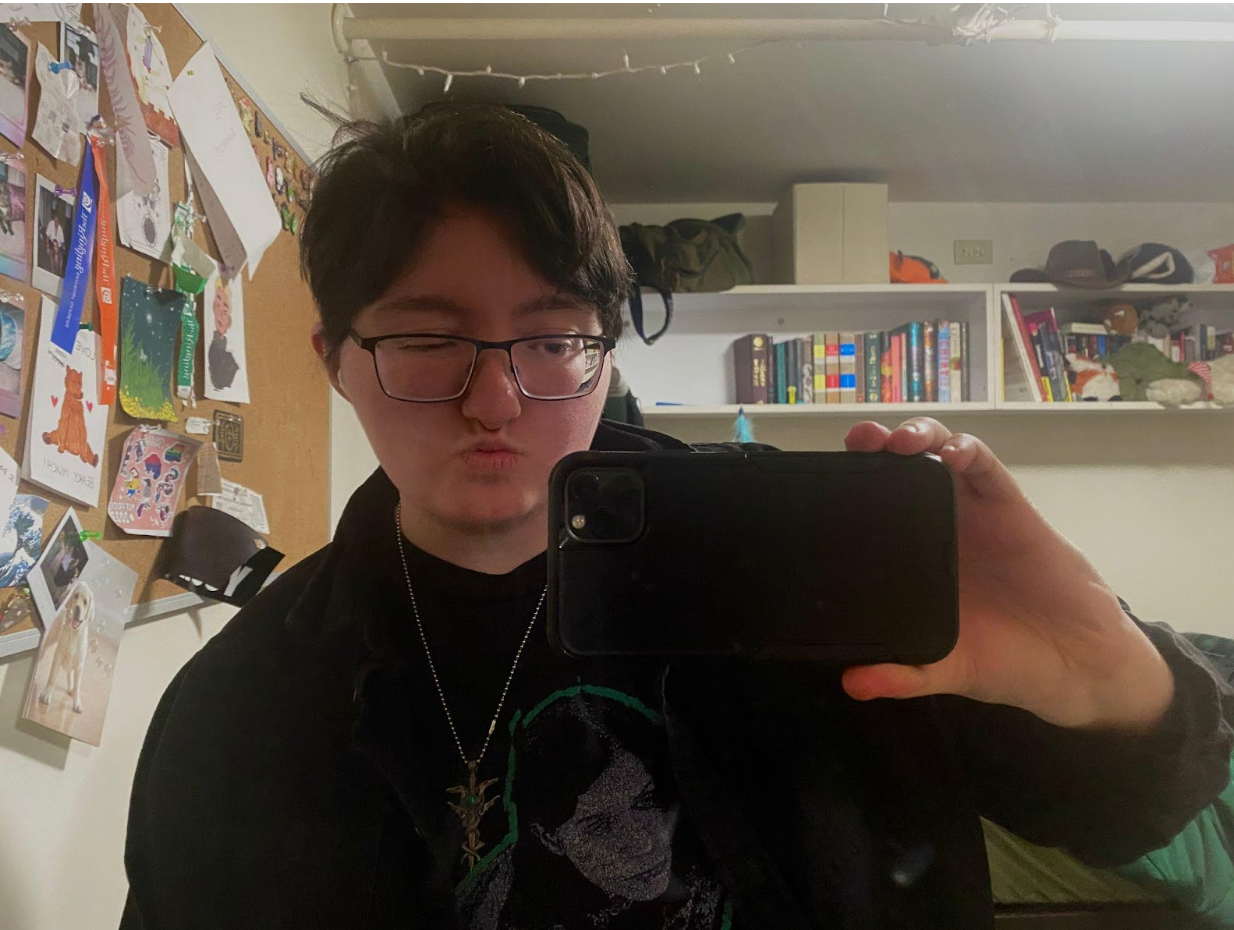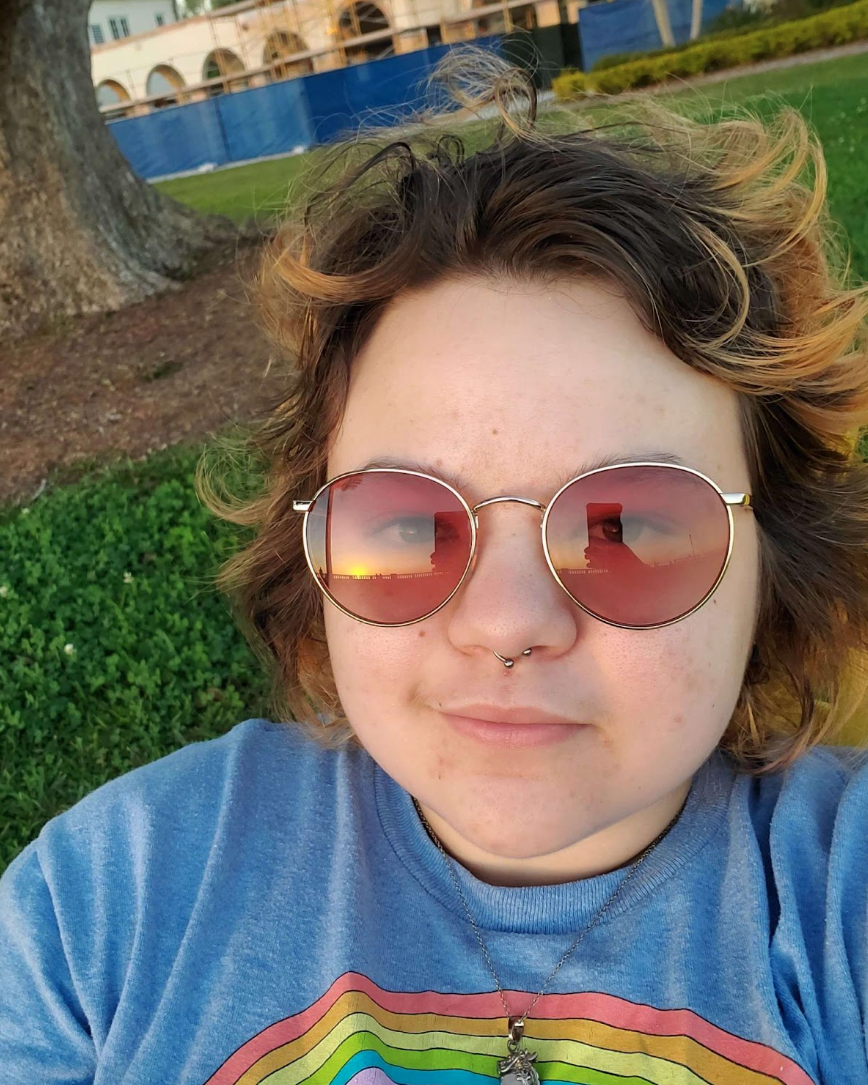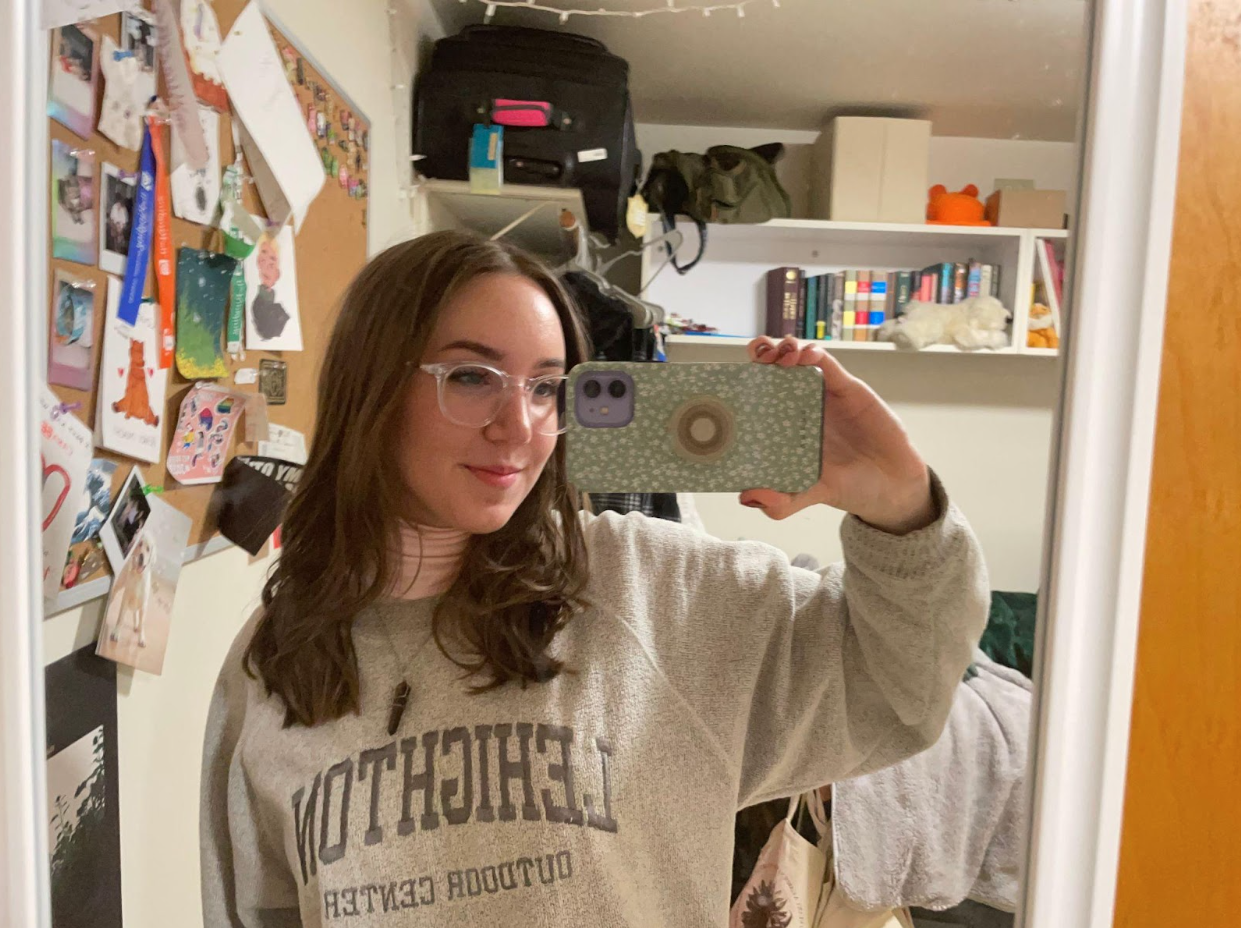It has been a little more than a year since the New College of Florida Board of Trustees (BOT) gained seven appointees in a move that many have described as a “political takeover.” of New College. The BOT has enacted shifts in the college’s direction, including the addition of sports programs, the appointment of President Richard Corcoran and unexpected housing changes. Those shifts have spurred many changes in the student body, with an influx of more than 300 new students and the loss of 186 former students at the start of Fall 2023. Some 36 faculty members, more than a third of the full-time teaching staff, had also left by the fall semester.
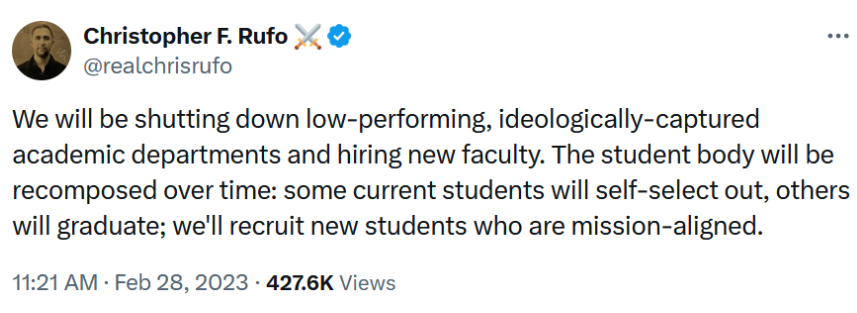
Hampshire College, a small, experimental liberal arts school in Amherst, Massachusetts with an academic model similar to New College, announced on March 9, 2023 that it would offer New College students tuition matching and no danger of losing credits. At least 58 students have transferred from New College to Hampshire as of Fall 2023, with 101 transfer applications filed in total. The Catalyst interviewed four former New College students who now attend Hampshire.
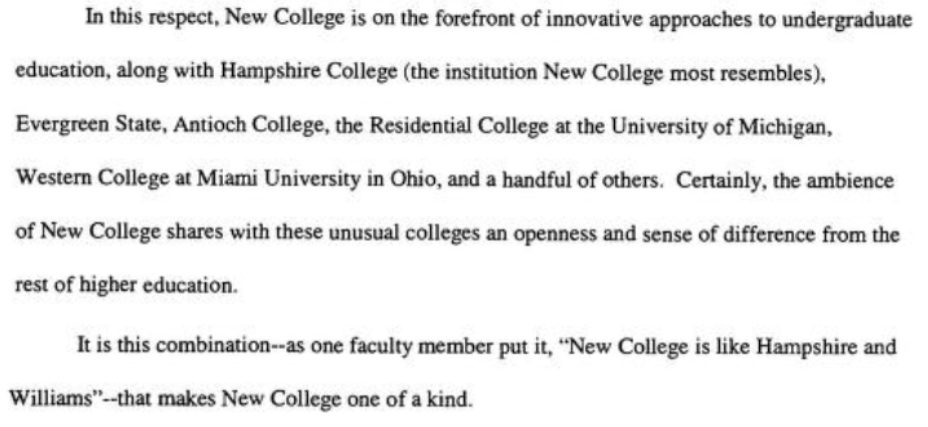
Abby Fussell transferred to Hampshire for the Spring 2023 semester, before the campus changes were announced. John Smith transferred in Fall 2023. Former Catalyst Copy Editor Basil Pursley had planned to stay, but transferred during July 2023 after finding out that drastic housing changes had displaced him from his dorm. Emily Anderson transferred in Spring 2024. Below are compiled responses to questions from the Catalyst through phone interviews.
Q: How did you feel about the initial “takeover”?
FUSSELL: I don’t know how many people I’ve told why I transferred from New College, but the backstory is because I was in a class where we had to go over the [Florida] House bills, and we were learning about ethics. They said, ‘We can’t say these things because of these House bills.’ As a gender studies person studying sex education, I was like, ‘I can’t study in Florida anymore.’ I didn’t see it coming for New College specifically, but I saw it coming for Florida. I was shocked, but I also wasn’t really shocked. I remembered being heartbroken about it, because New College was the only college I applied to originally. That was my home.
SMITH: I was decently upset about it because even though I knew it wasn’t going to affect me, or at least I thought it wasn’t going to affect me as much. Since I’m literally [studying] chemistry, I was more worried about my other friends who were in the humanities and were more active in the community. I was more concerned for them, like, okay, they might do something stupid, but nothing will be completely ruined. . . I would say I was pretty worried about it.
PURSLEY: Angry. Scared. That first week after the appointments, I remember just scrambling to do anything. . . As the semester went on, it was like, ‘Wow. This is really bad.’ Especially on the Catalyst, it was, ‘Okay, let’s go do an interview, let’s write on the next thing, let’s go to a Board meeting where they do nothing for four hours and then at the end they say okay now we’re destroying everything.’ That whole semester felt like grief. It still feels like grief, but I think even then I knew there was this possibility that this would be the last time I’d be in this community the way it is now.
ANDERSON: It was really stressful and overwhelming. I feel like at first I didn’t know what to expect, but as things happened it was scary to think about how it would affect our academics and the culture on campus.
Q: What were the initial warning signs, and when did it dawn on you that you needed to leave?
FUSSELL: That class, it was an ethics in humanities class, I think. I was really interested in the class, and then all of those House bills got introduced. He [the professor] put them on the screen and said, ‘Due to this we’re changing things a bit.’ It freaked me out. I felt like I couldn’t get the well-rounded education that I needed.
SMITH: I think it was in late March, early April that I realized I couldn’t be here anymore because two of my professors were denied tenure. This links back to the idea that it wasn’t going to affect me. It very much did. I would say, if you looked past everyone who was at the forefront of [activist involvement in] New College, I think I was one of the most academically affected. I could quite literally not continue. I had professors telling me, ‘You have to leave. There’s no other choice. This department is not going to stand in the time window of you graduating.’ I was only going to be there for another three semesters, so it was even worse.
PURSLEY: Over the Spring semester, there were some signs, but I was like, ‘No, I want to stay. I’m part of this and I don’t want to leave.’ I especially didn’t want to leave a public school to go to a private school. From the beginning, it felt kind of manipulative in a different way, but here I am. . . I remember my parents telling me they were worried for my safety. It was a lot of ‘I will support you if you go back to New College, but I worry every day for your safety at New College, in Florida, as a trans person.’ My partner expressed the same thing. . . It was also my [out of state] parents explaining they didn’t want their money going to these people and this administration. That was another big part.
ANDERSON: I guess the first warning signs were when my advisor left and I found out through a screenshot on Twitter that he was leaving. He didn’t tell me directly, which is funny, but it hit me like, ‘Oh shit, he’s really leaving. That really sucks.’
Q: Do you think you’ve made the right choice?
FUSSELL: I do. I personally just really love New England, so I think it’s opened up more opportunities to stay up here. While I was excited to do a thesis, I think the Div III project has opened more doors for me. I think I am able to create something that I would not be able to at New College.
SMITH: I think I made the best decision I could. I maybe could’ve gone to another school but this was the cheapest option. So, I’m willing to tolerate it for what it is.
PURSLEY: No. Transferring, in general, was the right option. Hampshire, though? If I could do it over again, I still would’ve transferred, just to the local state school in Georgia… We found out the dorms we were put in were deemed unsuitable for living, and they still put their New College transfers in these dorms. They didn’t give us any scaffolding for graduating unless we went out of our way to ask.
ANDERSON: Yes, for sure. I really enjoy being at Hampshire. Especially with Urban Studies, this is the right choice for me. With the Five Colleges, I have a lot of options and I’m not going to have to worry about a class I need and can’t take.
Q: How does it feel to be at Hampshire with so many former New College students?
FUSSELL: It’s definitely interesting. I’m really glad we were able to get some people over. I remember being brought into the admissions office and they were like, ‘How can we help? How can we do this? We want to include you in this.’ I was really grateful to Hampshire for wanting to do this. That was the right thing to do. I know that it’s a huge change for people and it wasn’t what everyone expected, but I do think they did their best. It is kind of strange to see people from Florida walking around, though, because during my first semester I didn’t know anyone. I made friends, but I still didn’t know them. They didn’t know me from being an RA [like at New College].
SMITH: It’s actually kind of frustrating because I don’t talk to as many of them as I would like to. Simply because for some reason the people I gelled with at New College, I don’t gel with them here. But it’s nice to have some people I knew from the past. If I had been like Abby, with no one else to lean back on, I would’ve been upset, and I would have felt pretty alone because the community at New College meant so much to me. Leaving was really hard and I still talk to a lot of people who still go to New College. I don’t even feel like the same person here. It’s so different.
PURSLEY: It definitely feels like I have, at least, allies here. I’m already socially anxious as a person, but it’s been hard for me to find any sort of community, because honestly that may just be what it’s like to be a transfer. . . It’s nice to just have familiar faces still in classes. It’s nice to know at least, okay, I don’t have to explain myself to you. There have been a few times where students have been weird to [my partner] and me about being transfers. Someone specifically asked Brendan, ‘Do you feel rescued here?’ What kind of question is that?
ANDERSON: I think it’s definitely nice. There’s not a whole lot I know, but seeing familiar faces, knowing we’re all doing it together definitely makes it less scary.
Q: Do you like Hampshire more than you miss New College?
FUSSELL: That’s really hard. I loved New College. I loved my friends. I loved getting to kayak whenever I wanted, I loved the pool. I loved my professors. I even loved some of my bosses. I loved it, and I hated Florida. The weather, not just the politics. I found more community at Hampshire. We have these Community-Engaged Learning (CEL) credits, which is basically making you do community work to pass your Divs. I feel like these are really valuable, because they put this responsibility of your community on you that New College didn’t do, I feel. As much as I love New College, I’m much happier here.
SMITH: I would say that in general I miss New College more than I like Hampshire. There are some things that Hampshire has that New College doesn’t. It’s mostly quality of life things, you get more dining dollars and the campus store is bigger. It’s been very nice to use the resources that have been given to me at Hampshire. For me, I don’t have a connection to the campus as much because I take all my classes at the Five Colleges Consortium.
PURSLEY: No.
ANDERSON: I would say it’s fairly even. I miss all my friends at New College a lot and I miss the location near the waterfront. Academically, I’m preferring Hampshire right now.
Q: Is the community at Hampshire comparable with New College at all? How about the level of student autonomy?
FUSSELL: It’s a little trickier being a transfer. Everyone kind of already knew what was going on at New College. I had at the time the Dean of Professors come up to me and say, ‘I’m so sorry. What can we do?’ I found a lot of community in the staff but student-wise everyone had already met each other. . . In the sense of making your own major, you’re forced to make your own major. There apparently used to be “Schools of Learning” but they don’t have that anymore. At New College you were more able to fall into categories, but as someone who is doing their Div III right now, it is very much on your own. . . You’re really expected to do more. There is no hand holding. Student government-wise, we just made one this year. . . there’s less autonomy on that side because it’s just starting. But, for overall classes and things, the Five Colleges provide a lot. There’s some classes at UMass we can take that even UMass students can’t really take. I love being able to take classes at the Five Colleges.
SMITH: The thing that frustrates me the most about Hampshire is that everyone is a lot younger than me. This incoming class is mostly first years. I’m about to turn 22 and I feel like I just have such a massive amount of difference in connection and personality… I felt like there were more people that were my age I could connect with at New College. Here, I kind of feel like a grumpy old man. Otherwise, there’s a decent amount of student agency. There’s a disability advocacy club, a student advocacy board. They don’t have a Senate or forum. The people here don’t like to communicate. There’s a Discord but people only like to argue with each other there. I don’t really know what it is. It might just be the North. I feel like there’s a big lack of student connection. I feel like [communication tools] are a lot less effective. I think I’m also so bitter from having to leave a community that really valued and accepted me that it’s hard to feel a deeper connection here.
PURSLEY: That’s a tough question, and I’m not sure I’m the right person to ask about that because of my social anxieties. But in terms of student autonomy, Hampshire doesn’t really have a student government. What we have is run by the student affairs department. It basically has admin control over it and they have very little voice, honestly. Something that stood out to me was that there’s no forum and no newspaper. There’s no community. There’s Discord servers and Yik Yak or whatever, but there’s no real way to communicate as a community. People don’t know about events as often because you have to be on their Campus Engage. I think it’s just difficult for the community to connect.
ANDERSON: I would say that the culture is similar. The vibe and the energy of people is very similar to the student body at New College. Hampshire is really missing the presence of a similar student government presence. I kind of miss that here but otherwise it’s really similar.
Q: What do you miss the most from New College?
FUSSELL: I miss my friends. I miss being able to kayak, and I miss the sunshine. I haven’t seen my two closest friends for almost a year now, and I do miss them.
SMITH: I genuinely miss the people. I also want to give a shout out to Boars Head. From the bottom of my heart, I really miss Boars Head. There’s nothing like a Boar’s Head flatbread pizza. I also miss how pretty it was there. It’s always gloomy and dark here.
PURSLEY: On a more individual level, the Catalyst. I miss being on the Catalyst and it felt like that was my community in a lot of ways. It felt like I really lost that when I came here. I’m still working in journalism but I do miss working on the Catalyst specifically. Overarchingly, I miss the community and I really miss the faculty, who honestly would’ve been gone even if I had stayed. I miss the challenge in classes. No offense to my Hampshire faculty but the level of rigor here is not even comparable…This is a weird thing to complain about, but I feel bored. This is why I’m still writing a thesis . . . It’s what I’ve been training for this whole time.
ANDERSON: Definitely my friends. I loved the campus, it was beautiful. I definitely miss the warm weather and the bayfront.
Q: How do Hampshire and New College’s academics measure up to each other?
FUSSELL: I was definitely much more burnt out at New College than at Hampshire. I get nervous sometimes. I feel like I’m somehow missing something academically because I’m not as burnt out. I would say taking classes at Smith has a similar rigor to New College. New courses are more rigorous, but Hampshire allows you to explore different colleges and intersects different subjects. I took a queer dance course that combined queer theory and dance which was super cool. I also think that Hampshire is improving its courses with the hiring of new faculty that’s happening right now.
SMITH: I think I found out too much stuff the hard way. The Hampshire academics rely a lot on ‘going with the flow’ but it’s not just the students going with the flow, it’s the staff too. I don’t think that’s a good thing. I feel like I was busting my ass at New College, I feel like if I took classes at Hampshire, it wouldn’t be even close.
PURSLEY: I think Hampshire and New College were founded on the same principles of student-guided education. You are crafting your own curriculum, which is great, and I feel like that is definitely respected here but I just don’t feel like the academic rigor is matched. If you are looking for more challenges here, it’s just harder to find. . . Another thing is that New College had a pretty good balance of being student-guided and giving students guidance.. Here, there’s not majors, or departments, or AOCs [Areas of Concentration] really. This is kind of a detriment to students; it’s harder to narrow in on what you really want to do. I feel like New College adequately sets you up for graduating, going to graduate school, for leaving New College. I don’t feel like Hampshire has as much support for that.
ANDERSON: I think they’re similar in the ways you can have a lot of personalization with classes and what you want to do and encourage independent studies the same way. New College honestly seems to demand more from their students, which is something that I kind of wish that Hampshire had, because I enjoy rigorous work but it’s made up for with the classes I can take at the other colleges.
How do you think Hampshire students have received the influx of New College students?
FUSSELL: I’ve heard mixed things. I’ve heard some Hampshire students be upset that they’re not getting a tuition discount but we are. I’ve also heard a lot of love for New College students.
SMITH: I think that a lot of New College students were tired of having to explain things over and over again, while others were not. I feel like some people were just so mentally exhausted that they wanted to be treated like a normal person, and I think Hampshire has mostly done that.
PURSLEY: I think the ‘do you feel rescued’ thing puts it pretty poignantly. I don’t want to rag on the students here. It’s alright but it is a culture shock here. It is definitely a cultural difference.
ANDERSON: I think most of the people I’ve met and become friends with are normal and friendly. On Yik Yak, there was a period of tension at the beginning of the semester but I think most people have been normal about it.
What would you say to whoever is still remaining at New College?
FUSSELL: I wish you all well and I am so proud of you.
SMITH: For everyone still at New College despite everything that’s happened, I’m genuinely so proud of you for putting up with everything you’ve had to deal with. I think if you can try finding a community college or another college in Florida or out of state if you live out of state, that’s your best bet. I want you all to consider all of your options before thinking about coming here, because you might be finding a better opportunity elsewhere. I love you guys, and I’m very proud of you all for going through everything you’ve gone through.
PURSLEY: I feel proud of everyone who has stayed. I don’t want to say ‘you’re so brave’ or whatever because I don’t know why everyone made their decision to stay, or not stay, and we all are in our different circumstances. I made what felt like the best choice for me at the time, and everyone else probably made the best choice for them at the time. I am just very glad there are still people there. I’m proud of everyone who is still continuing to live the spirit of New College there.
ANDERSON: Make sure you do what’s the best thing for you.

